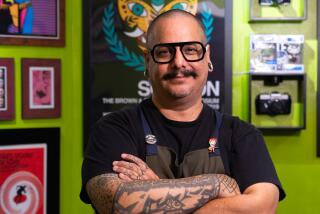Fallen Marine Is Recalled as Pacifist, Activist
- Share via
Hoisting farm workers banners and echoing chants of Latino empowerment, family and friends attending funeral services in Indio on Wednesday remembered Marine Cpl. Jesus A. Gonzalez as a political activist and pacifist.
The gathering of about 200 included Marine pallbearers and mourners wearing T-shirts of the United Farm Workers, the Zapatista rebels of Mexico and revolutionary Che Guevara.
Gonzalez, who was killed April 12 in Iraq, reportedly from gunfire at a security checkpoint, was buried after the crowd sang “Si, se puede” (It can be done), a staple of Latino political rallies, and the Mexican standard “De Colores.”
Family members said the funeral reflected Gonzalez’s upbringing by parents active in the farm worker movement
For many present, Gonzalez’s death was a twist of fate. They said the 22-year-old opposed war, but enlisted in the Marines because he had a fascination with the military.
“He had strong convictions. There’s a strong irony that he died in a war he opposed,” said the Rev. Miguel Ceja, who spoke at a funeral Mass at Our Lady of Perpetual Help Catholic Church.
Gonzalez’s liberal bent was learned in childhood.
He was a native of Linares, 75 miles from Mexico’s third-largest city of Monterrey. His father and mother separated when he was a toddler and he was brought at the age of 9 to La Quinta by his mother and stepfather. Both worked as organizers in the United Farm Worker movement, and Gonzalez was often taken to labor marches. His step-grandfather, Leopoldo Trevino, said he worked for UFW founder Cesar Chavez.
When Gonzalez was 11, he participated in a protest of the first Gulf War.
“He was not in favor of war,” said his stepfather, Leopoldo Trevino-Sosa. “He never imagined [himself as] part of an invasion or domination of another country. He was a soldier, but he was a pacifist.”
At Indio High School, he was the president of the Movimiento Estudiantil Chicano de Aztlan and organized a protest against Proposition 187 that led to a three-day suspension.
“He told my parents, ‘I know school is important. But I need to do this.’ And he did,” said his sister, Carla Gonzalez.
In 1998, he graduated among the top 20 students in his class.
While in high school, he also supported a movement to stop sludge dumping on land owned by the Torres Martinez Desert Cahuilla Indians near Thermal. At the Coachella Valley Public Cemetery on Wednesday, Joe Benitez, a tribal elder of the Cabazon Band of Mission Indians, and Wally Anton, a Quechan tribal elder, said Indian blessings to the north, south, east and west, burning sage incense in shells and fanning the smoke with large feathers.
Gonzalez curtailed his local activism when he attended UC Riverside in 1998 and 1999. Carla Gonzalez said she knew he didn’t want to be there. He entered college to appease his parents, she said. His real interest was being an Air Force pilot. But he was colorblind, so he entered the Marines instead.
“It was a secret. I know he wasn’t going to stay in college. He just didn’t want to anger anyone. He wanted to take a different path though,” his sister said.
When he called home to jubilantly announce that he enlisted, his mother said, “I cried and cried. I never liked the military. It came suddenly, but I knew in my heart it wasn’t a sudden decision. I told him, ‘If it’s the uniform you want, I’ll buy you one.’ ”
Through a Marine friend also stationed at the base in Twentynine Palms, Gonzalez met Guadalupe Yvonne Avalos when he was 18 and she was 15. Soon after, the couple had a daughter, Delilah.
On Wednesday, Avalos wore the pink dress she put on for their quick courthouse wedding three months ago before Gonzalez was deployed to the Middle East.
With help from Gonzalez’s stepfather, Avalos made it to the pulpit of the church Wednesday. Between sobs, she called her husband “the most precious gift from God, along with our daughter Delilah. He is our everything.”
Gonzalez was scared before he left for Iraq, according to his step-grandfather, Leopoldo Trevino. “He wanted things to be solved with words, not guns,” he said.
More to Read
Sign up for Essential California
The most important California stories and recommendations in your inbox every morning.
You may occasionally receive promotional content from the Los Angeles Times.











